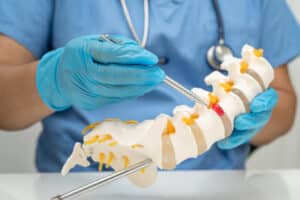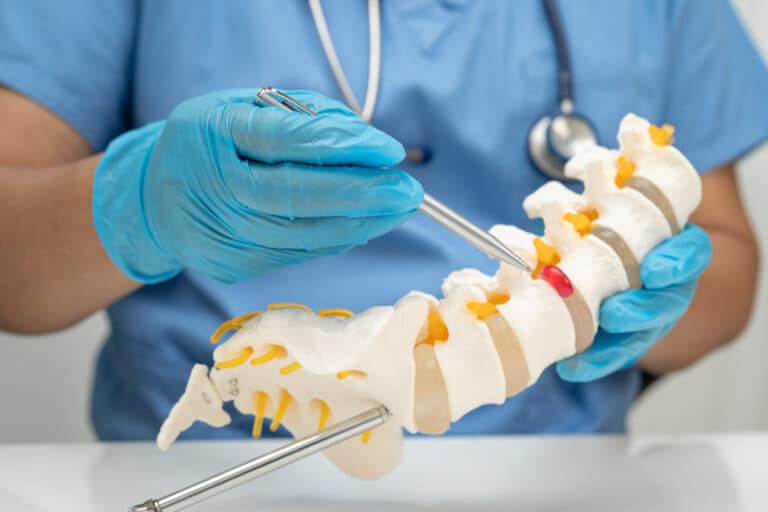
Surgery can provide permanent relief for spine pain that resists other treatment. With so many proven procedures available, however, it can be difficult to know which approach is best. NU-Spine: The Minimally Invasive Spine Surgery Institute provides advanced spine procedures for a wide variety of spine conditions at locations near you throughout New Jersey. Here, we discuss the benefits, downsides, and applications of disc replacement vs. fusion to help patients make informed decisions about their treatment.
What Is Disc Replacement?
Disc replacement is a surgical procedure to replace a problematic spinal disc with an implant. After carefully removing the original disc, the surgeon places a custom-made artificial disc in its place. The new disc is made from durable surgical-grade rubber designed to perform the same function as a natural spinal disc. This eliminates pain while preserving the spine’s original range of motion.
Pros and Cons of Disc Replacement
Disc replacement surgery is a solution for degenerative disc disease and herniated discs that preserves the spine’s original mobility. It is also a minimally invasive spine surgery, meaning patients often recover more quickly. These two factors make it the preferred treatment when appropriate.
It is not always a viable solution, however. While disc replacement can effectively treat pain from various spinal disc issues, it requires the rest of the spine to be in good condition. If the vertebrae on either side of the problematic disc are affected by injury, osteoporosis, or arthritis, then disc replacement will not effectively eliminate pain. New degeneration can also affect the results of disc replacement, causing new pain in areas that have already been treated effectively.
Who Should Have Disc Replacement?
Disc replacement is ideal for patients who are in overall good health besides their disc issues. The following may be good candidates for disc replacement:
- Patients with good bone quality and spine health
- Patients whose pain originates from a specific disc or discs
- Patients whose disc issues are limited to only one or two discs
- Patients without major spinal instability, degeneration, or deformities
- Patients who are not at risk of developing spinal instability or degeneration
- Patients who wish to maintain an active lifestyle
If the cause of back pain is unclear, if the vertebrae are in poor shape, or if the disc condition affects a large portion of the spine, then disc replacement is not recommended. The procedure is unlikely to provide relief. Even if it does address the patient’s pain, its results will be unstable, forcing the patient to seek additional surgeries as their back degenerates further.
What Is Spinal Fusion?
Spinal fusion is a surgical procedure to fuse two or more vertebrae together. The surgeon removes the spinal disc between the vertebrae to be fused, then fills the gap with bone graft material taken from the patient’s own body or sourced from a donor bank. Platinum implants are used to lock the vertebrae in place. Over time, the bone graft will solidify and join the vertebrae into a single sturdy bone.
Pros and Cons of Spinal Fusion
Spinal fusion is a proven procedure that addresses a wide variety of complex spine complaints. Not only can it eliminate pain from spinal disc complaints, it is also an effective solution for degenerative joint disease (arthritis), kyphosis, other spinal deformities, and traumatic injuries. It does not require the bone to be in good condition, and it can be used to treat large sections of the spine at once. Finally, its benefits are long-lasting with a low risk of pain returning to the same area.
The procedure accomplishes all this at the cost of spine mobility. Spinal fusion relieves pain, but it does so by eliminating movement in the joint. This can limit the patient’s activity levels after surgery. In addition, spinal fusion is a more extensive procedure. Recovery takes longer and may be more stressful.
Who Should Have Spinal Fusion?
Spinal fusion is widely applicable to a variety of spine conditions. Because it permanently reduces the patient’s mobility, however, it is recommended only when the patient and surgeon agree that the tradeoff is worth it. The following individuals are good candidates for spinal fusion:
- Patients with spine instability, such as spondylolisthesis
- Patients with significant bone degeneration, including arthritis or osteoporosis
- Patients with spinal deformities, such as scoliosis or kyphosis
- Patients whose pain does not have a clear source
- Patients whose disc issues affect multiple levels of the spine
- Patients whose disc issues have returned despite prior surgeries
Many patients who receive spinal fusion find that the relief they experience is worth some lost mobility. They enjoy improved sleep, reduced reliance on pain medications, and an overall higher quality of life, with the peace of mind that their painful spine condition is gone for good.
Consult with a Spine Specialist Near You in New Jersey
If you are struggling with spine pain that resists treatment, surgery may provide a permanent solution. Surgeries at NU-Spine are performed by an award-winning neurosurgeon, Dr. Branko Skovrlj. He has extensive experience with both disc replacement and spinal fusion. With a thorough examination and analysis, he can help patients determine the best option for their needs.
NU-Spine: The Minimally Invasive Spine Surgery Institute specializes in providing the latest spine treatments at locations near you in New Jersey. To learn more about our services or to discuss the benefits of disc replacement vs. fusion, contact us today.

